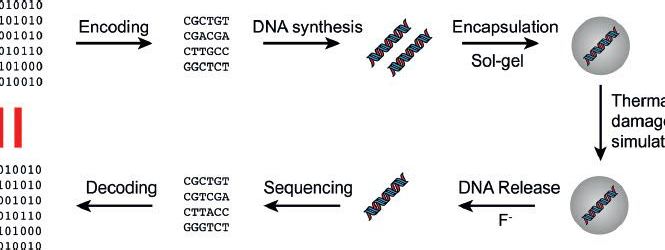Circa 2015
ETH researchers have found an error-free way to store information in the form of DNA, potentially preserving it for millions of years: encapsulate the information-bearing segments of DNA in silica (glass), using an error-correcting information-encoding scheme.
Scrolls thousands of years old provide us with a glimpse into long-forgotten cultures and the knowledge of our ancestors. In this digital era, in contrast, a large part of our knowledge is located on servers and hard drives, which may not survive 50 years, let alone thousands of years. So researchers are searching for new ways to store large volumes of data over the long term.
Recently, 300,000 year old mitochondrial DNA from bears and humans has been sequenced. DNA has also been utilized as a coding language, for applications in forensics, product tagging, and DNA computing, the researchers note.
